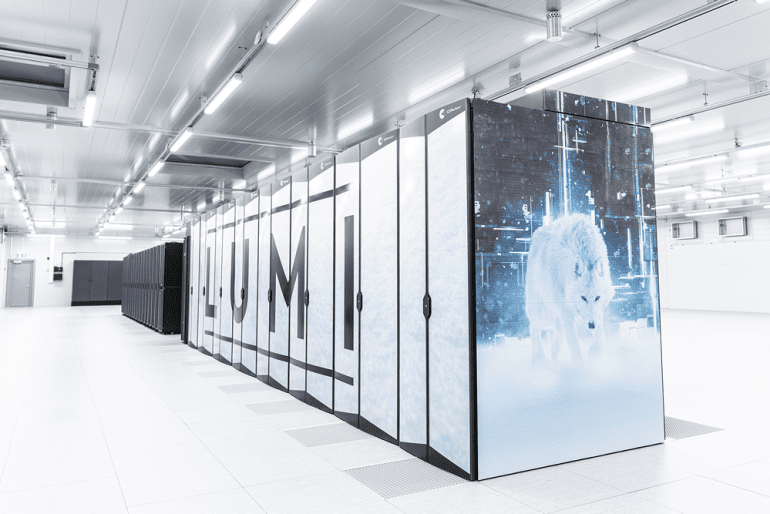- New batch of Finnish research projects utilizing LUMI supercomputer’s GPU capacity announced.
- Projects include advancements in healthcare, atmospheric science, and AI innovation.
- Focus areas: heterogeneous catalysis, solar storm dynamics, atmospheric particle formation, AI language models in healthcare.
- Goals: Enhance catalyst behavior understanding, improve solar storm prediction, predict molecular properties for climate research, advance AI language models for healthcare diagnostics.
- Impact: Potential for optimized industrial processes, enhanced space weather monitoring, improved climate change mitigation, personalized healthcare solutions.
- Collaborative efforts between academic institutions and AI companies driving innovation forward.
Main AI News:
In a groundbreaking announcement, the fifth batch of Finnish research projects leveraging LUMI, Europe’s fastest supercomputer, has been unveiled. These pioneering projects, harnessing the immense GPU capacity of LUMI, aim to propel advancements in various fields, notably healthcare and atmospheric science. With a focus on AI innovations, these projects promise to revolutionize diagnostics, treatment methodologies, and our understanding of complex phenomena such as climate change.
The selection of six new projects marks a significant milestone in Finland’s journey towards scientific excellence and technological innovation. These projects, made possible through Finland’s allocation of resources from the LUMI infrastructure, encompass a wide spectrum of research endeavors, each poised to make a profound impact on society.
ALVS: Active Learning for Vibrotational Spectroscopy
Led by PI Patrick Rinke and co-PI Ondrej Krejci from Aalto University, the ALVS project sets out to enhance the understanding of heterogeneous catalysis, particularly in the production of green fuels like methane and methanol. By leveraging machine learning models to predict vibrational spectra, researchers aim to decipher the intricacies of catalyst behavior, essential for optimizing industrial processes and mitigating environmental impact.
DYNSCON: Dynamos in Stratified and Rotating Convection with Low Prandtl Numbers
Under the guidance of PI Maarit Korpi-Lagg and co-PI Jörn Warnecke, the DYNSCON project delves into the enigmatic realm of solar storms. By simulating dynamo processes within the Sun’s convection zone, researchers strive to unravel the mechanisms underlying these celestial phenomena. With the potential to develop methods for early detection and monitoring of solar disturbances, this project holds promise for bolstering our preparedness against space weather events.
EXPAND ATMOS: Expanding Property Prediction and Machine Learning Models for Atmospheric Science
Helmed by PI Patrick Rinke and co-PI Hilda Sandström, the EXPAND ATMOS project seeks to elucidate the intricate interplay between human emissions, atmospheric particles, and climate change. By harnessing the power of AI and computational modeling, researchers aim to predict molecular properties critical for understanding particle formation processes. This endeavor not only enhances our grasp of climate dynamics but also paves the way for innovative solutions to mitigate environmental challenges.
LumiLLM Experts: Lumi Large Language Model Experts
In a collaborative effort between the University of Turku and Silo AI, PI Sampo Pyysalo and co-PI Jonathan Burdge spearhead the LumiLLM Experts project. Building upon previous advancements in large language models, this endeavor seeks to push the boundaries of generative AI systems with a focus on multilingual applications. By fostering innovation and knowledge sharing within the AI research community, this project holds immense potential for addressing diverse challenges across various domains, including healthcare.
MFM: Medical Foundation Model
Led by PI Guoying Zhao and co-PI Wei Peng, the MFM project aims to revolutionize healthcare delivery through the development of a Medical Foundation Model. By leveraging deep learning and pretrained models, researchers seek to enhance diagnostic accuracy and robustness, particularly in data-limited scenarios. With a comprehensive evaluation spanning multiple modalities and tasks, this project promises to usher in a new era of personalized medicine and improved patient outcomes.
PANENCODER: PanEncoder – A Multi-Tissue Foundation Model for Digital Histopathology
Under the guidance of PI Esa Pitkänen and co-PI Tuomas Mirtti, the PANENCODER project endeavors to revolutionize cancer detection and treatment decision-making through digital histopathology. By extending foundation models to a pan-cancer setting, researchers aim to achieve state-of-the-art results in diagnosis, prognosis prediction, and treatment selection. With a commitment to advancing global healthcare and fostering equitable access to cutting-edge technologies, this project represents a beacon of hope in the fight against cancer.
Conclusion:
The announcement of these pioneering Finnish LUMI projects signifies a significant step forward in research and innovation. With a focus on addressing pressing societal challenges, such as healthcare delivery and climate change, these projects have the potential to revolutionize industries and improve quality of life. Collaborative efforts between academia and industry are driving forward the boundaries of scientific knowledge and technological capabilities, paving the way for a more sustainable and technologically advanced future market.

